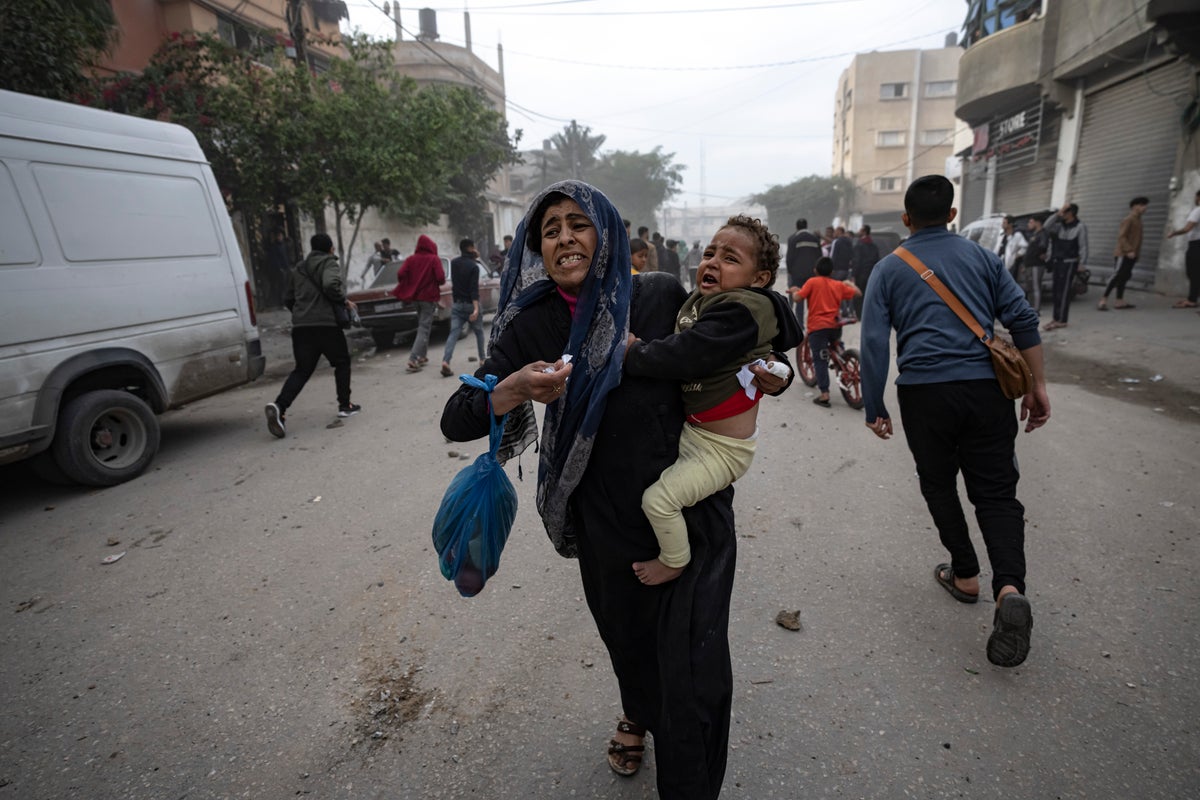
The White House has said that “very serious” negotiations are taking place in Cairo over the terms of a new ceasefire agreement in Gaza and the release of more Israeli hostages, even as Hamas’s rejection of a temporary pause threw the possibility of a deal into doubt.
Hamas leader Ismail Haniyeh arrived in Egypt on Wednesday for discussions on “aggression in the Gaza Strip and other matters”, the Palestinian group said in a statement.
“These are very serious discussions and negotiations, and we hope that they lead somewhere,” White House spokesperson John Kirby told reporters aboard Air Force One.
When asked about the anticipated outcome of the meeting, Mr Kirby said “let’s not get ahead of where we are right now”.
Mr Haniyeh arrived in Cairo for the first time in more than a month for discussions with Egyptian officials, who are seeking to strike another truce between the warring parties. An earlier ceasefire, during which dozens of Israeli women and children were released by Hamas, was brokered by Qatar.
Taher Al-Nono, media adviser for Mr Haniyeh, told Reuters that Hamas would accept nothing less than the complete end to Israel’s offensive in Gaza and an increase in the volume of humanitarian aid allowed to reach Palestinian civilians before he would discuss further releases of hostages.
“The issue of prisoners can be negotiated after these two matters are achieved. We cannot talk about negotiations while Israel continues its aggression. Discussing any proposal related to prisoners must occur after the cessation of aggression,” Mr Nono said in Cairo.
Iran’s foreign minister Hossein Amir-Abdollahian (left) shakes hands with Hamas chief Ismail Haniyeh, during a meeting in Doha, Qatar— (AP)
“We have talked with our brothers in Egypt, outlining our stance on this aggression and the urgent need to stop it as a top priority,” he added.
Hamas issued a statement on Thursday declaring: “There is a Palestinian national decision that there should be no talk about prisoners or exchange deals except after a full cessation of aggression.”
Islamic Jihad, a smaller Palestinian militant group, is also holding hostages in Gaza.
A source who was aware of the negotiations said envoys intensively discussed which of the hostages still held by Palestinian Islamist militants in Gaza could be released in a new truce in exchange for Palestinian prisoners.
Israel is demanding the release of all remaining women and infirm men among the hostages, according to an unnamed source familiar with the negotiations. There is a possibility that Palestinians convicted of serious offences might be included in the list of prisoners to be freed by Israel if this were to take place.
Mr Haniyeh’s trip to Egypt marked a rare personal involvement in diplomacy, a step he had taken in the past only when there was potential progress. His most recent visit to Egypt was in early November, just before the announcement of the only ceasefire in the Gaza war to date, a week-long pause resulting in the release of approximately 110 hostages held by Hamas.
About 120 hostages out of the 240 taken during the 7 October attacks remain under the control of Hamas. Families of the remaining hostages are pressuring the Israeli government to broker a new ceasefire, hoping that it will lead to their release.
Tal Almog-Goldstein stands in a bus transporting him to an army base in Israel after he was released by Hamas in the Gaza Strip on 26 November— (AFP via Getty)
Israel has not commented publicly on the stalled talks in Egypt. But Israeli prime minister Benjamin Netanyahu repeated his regular refrain that the war would end only with Hamas eradicated, all hostages freed and Gaza posing no more threat to Israel.
“Whoever thinks we will stop is detached from reality. All Hamas terrorists, from the first to the last, are dead men walking,” he said in a statement on Wednesday.
As the near continuous bombardment of Gaza continues, the Israel Defence Forces have said they have uncovered a major Hamas command centre in the heart of Gaza City.
They said the raid on the vast underground network was a serious blow to the Islamic militant group as pressure grows on Israel to scale back its devastating military offensive in the coastal enclave.
The US, its closest ally, has continued to support Israel’s right to defend itself but demanded Mr Netanyahu’s forces conduct a “more targeted operation” to avoid civilian casualties.
People flee following Israeli air strikes on a neighbourhood in the al-Maghazi refugee camp in the central Gaza Strip on 6 November— (AFP via Getty Images)
“It’s clear that the conflict will move and needs to move to a lower intensity phase,” the secretary of state Antony Blinken said. He said the US wants to see “more targeted operations” with smaller levels of forces focused on specific targets, such as Hamas’ leaders.
In New York, a vote on a draft Security Council resolution calling for “urgent and extended humanitarian pauses” in Gaza was delayed for the third day in a row.
The delay followed tense diplomatic negotiations regarding the wording of a text to prevent a US veto. The primary issue reportedly revolved around the inspection and monitoring of humanitarian aid entering Gaza.







